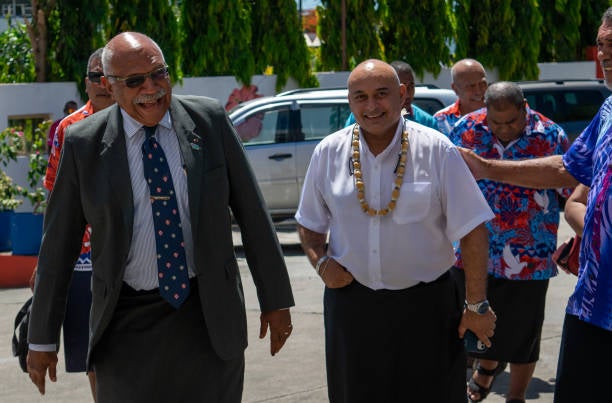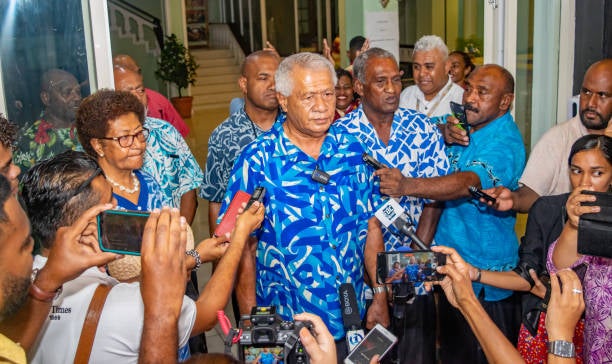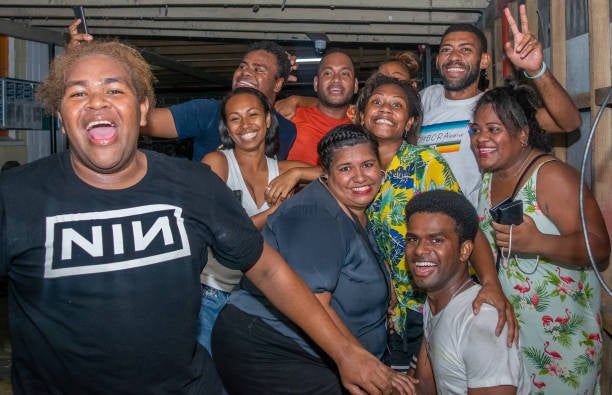Attempts to oust Fiji PM Frank Bainimarama after his 16-year reign hit roadblock
Coalition parties come together to put up rival Sitiveni Rabuka as new prime minister

Your support helps us to tell the story
From reproductive rights to climate change to Big Tech, The Independent is on the ground when the story is developing. Whether it's investigating the financials of Elon Musk's pro-Trump PAC or producing our latest documentary, 'The A Word', which shines a light on the American women fighting for reproductive rights, we know how important it is to parse out the facts from the messaging.
At such a critical moment in US history, we need reporters on the ground. Your donation allows us to keep sending journalists to speak to both sides of the story.
The Independent is trusted by Americans across the entire political spectrum. And unlike many other quality news outlets, we choose not to lock Americans out of our reporting and analysis with paywalls. We believe quality journalism should be available to everyone, paid for by those who can afford it.
Your support makes all the difference.The fate of Fiji’s newly chosen prime minister Sitiveni Rabuka is hanging in the balance despite coalition parties coming together and pledging to elect him as their leader.
Mr Rabuka was set to become the country’s new prime minister after nearly 16 years by dislodging incumbent Frank Bainimarama, who ruled the country since 2006.
But a formal coronation of the newly elected leader will have to wait as a key parliament session was delayed.
The country’s three political parties – the People’s Alliance Party, National Federation Party and Social Democratic Liberal Party – announced on Tuesday they would form a coalition following days of negotiations after last week’s election that had seen the two leaders enter into a deadlock.
The constitution of the country requires lawmakers to elect the prime minister from the parliament floor if no one party does not win more than 50 per cent of seats.
While Mr Rabuka’s People’s Alliance Party won 21 seats, with ally National Federation Party winning five seats, Mr Bainimarama’s Fiji First party secured 26 seats.
The Social Democratic Liberal Party (Sodelpa), a power-broker holding three seats in the hung parliament, yesterday signed a coalition agreement with Mr Rabuka’s People’s Alliance and the National Federation Party.

Sodelpa’s decision was made after a close vote that saw 16 of its board members in favour, while 14 supported Mr Bainimarama‘s Fiji First.
The party’s general secretary Lenaitasi Duru resigned over the outcome, and wrote to Fiji’s parliament and the president of the country requesting a delay in parliament’s return, claiming Sodelpa’s decision was “null and void”, TV network FBC reported.
Subsequently, the parliament delayed its first sitting, where it had been expected that the new prime minister would be sworn in to the Pacific islands nation for the first time in 16 years.
Fiji parliament’s secretariat informed Reuters that parliament would not be sitting today as Fiji’s president Wiliame Katonivere has not yet issued a proclamation.
Meanwhile, Fiji’s police force have called for calm and urged “all Fijians to respect the political process”.
“We are concerned about the number of reports of stoning incidents received last night targeting the homes and businesses of Fijians of Indian descent,” Commissioner of Police Brigadier General Sitiveni Qiliho said in the statement.
The Pacific island nation, with a population of 900,000, had a history of military coups before constitutional reform in 2013 removed a race-based voting system that favoured indigenous Fijians over a large Indian ethnic group.
Earlier, Mr Rabuka thanked the Social Democrats for “giving us the honor” of forming the next government in the country.

“A government we hope that will bring the change that people had been calling out for over the last few years,” Mr Rabuka said at a news conference.
“It’s going to be an onerous task. It will not be easy, and it was never easy to try and dislodge an incumbent government. We have done that, collectively.”
Mr Bainimarama won democratic elections in 2014 and 2018 with the support of the Indian community, but has faced criticism over his government’s punitive media laws and pressure on the judiciary, and has not commented publicly since voting last week.
Meanwhile, New Zealand prime minister Jacinda Ardern said the country was yet to congratulate Mr Rabuka as it was waiting until the “dust settles and there is finality over processes”.
“I have faith in Fiji’s ability to conduct the remaining stages of this process and stand ready to acknowledge their new leader,” she said.
Additional reporting by agencies
Join our commenting forum
Join thought-provoking conversations, follow other Independent readers and see their replies
Comments